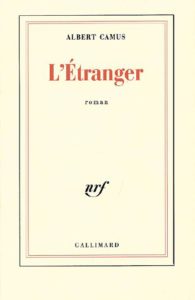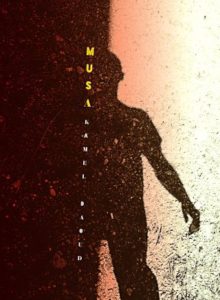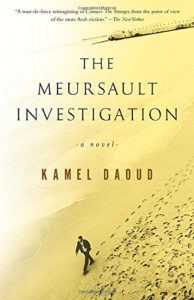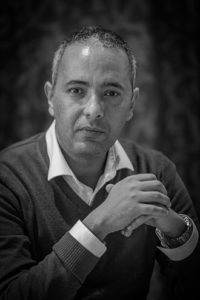Assault on Meursault
You may or may not remember the name “Meursault” but the French and many Arabs sure do. He is the ghostly narrator of the book “The Stranger” by Albert Camus, a gem of mid-20th century literature that, despite its petite size, towers over much of the modern era’s struggle with meaning and existence. I was drawn back to a rereading of the book by a short story (more on that later) and a discussion with my son Kip about our shared fascination with that amazing era of existentialist exploration …
Albert Camus “The Stranger” (1942)
 “The Stranger” takes place in French Algeria. The year is 1942. Meursault is a young man. We know immediately that his mamam has passed away from the opening sentence of the book—and much of the narrative is a memoir of his life and obligations in looking after a mother that disapproved of him. That he is indifferent is a understatement. Her death and the aftermath comprise the pivot on which the story revolves. The emptiness and heat and blinding light of the Algerian seaside punctuate the lack of feeling our narrator has for damn near everything. He carries on dreamlike, hanging with a friend named Raymond, finally landing a job, but somewhere in mid-book, his utter aimlessness is hijacked by this friend who needs his help with some scurrilous retribution against a former girlfriend. In short order, things get way out of hand. Raymond beats the girl and is held by authorities. Meursault is called to testify, and his testimony helps to clear his friend. Raymond is released but before you know it, he finds himself being followed by the girlfriend’s boyfriend and his Arab friends. Meursault finds himself drawn into Raymond’s stupid idea to track down these dudes out on the beach. Raymond heads in one direction. Meursault, on his own and suddenly sensing a present danger, spies an Arab who appears to him in the glare of the sun. The figure appears to be wielding a knife. Meursault pulls his pistol, and shoots him dead. Fires five bullets in fact. Literally happens in an instant. It is a criminal act at once unexpected and spontaneous and meaningless. And even though it is also specifically associated with his friend’s honor, Meursault himself is arrested and detained. Raymond is never again to be seen or heard from.
“The Stranger” takes place in French Algeria. The year is 1942. Meursault is a young man. We know immediately that his mamam has passed away from the opening sentence of the book—and much of the narrative is a memoir of his life and obligations in looking after a mother that disapproved of him. That he is indifferent is a understatement. Her death and the aftermath comprise the pivot on which the story revolves. The emptiness and heat and blinding light of the Algerian seaside punctuate the lack of feeling our narrator has for damn near everything. He carries on dreamlike, hanging with a friend named Raymond, finally landing a job, but somewhere in mid-book, his utter aimlessness is hijacked by this friend who needs his help with some scurrilous retribution against a former girlfriend. In short order, things get way out of hand. Raymond beats the girl and is held by authorities. Meursault is called to testify, and his testimony helps to clear his friend. Raymond is released but before you know it, he finds himself being followed by the girlfriend’s boyfriend and his Arab friends. Meursault finds himself drawn into Raymond’s stupid idea to track down these dudes out on the beach. Raymond heads in one direction. Meursault, on his own and suddenly sensing a present danger, spies an Arab who appears to him in the glare of the sun. The figure appears to be wielding a knife. Meursault pulls his pistol, and shoots him dead. Fires five bullets in fact. Literally happens in an instant. It is a criminal act at once unexpected and spontaneous and meaningless. And even though it is also specifically associated with his friend’s honor, Meursault himself is arrested and detained. Raymond is never again to be seen or heard from.
Of course there are other characters and plot points but for the remainder of the book Meursault is in jail and, eventually, in court. His consciousness becomes distracted and dreamlike as he thinks about his past, his own girlfriend, and interacts with the investigator. His thoughts are in a way monotonal but, as he recalls the details of his life, we are absorbed in his bland existence which, however, is made up of insightful love for casual details of love and life and logic that in a way is mesmerizing. Gradually he caves in to the machinations of the legal system, fully acquiescing to the futility of everything. Worst of all, in an absurd and all too surreal outcome, the prosecutor, finally realizing that the shooting alone could be justified in self-defense, makes the case instead that Meursault is a monster. The young man’s fate is sealed, both from witness testimony and his own account, his own avowed alienation from commonly held beliefs, and based mostly on the fact that he did not cry at his mother’s funeral.
The sheer absurdity of this event lies as much in the existence in a world without basis in absolute authority (without God), as in the crystalline prose and aimless characterization of Meursault himself. But I needn’t go on.
Kamel Daoud “Musa” (2015)
 Suffice it to say that we today, in 2015, have a very different viewpoint from which to assess the legacy of Camus, a Frenchman who was born and raised in Algeria, and the concerns of his book. It is a reprisal and a rebuttal, in the form of . . . another novel . . . and for me, a most amazing rediscovery.
Suffice it to say that we today, in 2015, have a very different viewpoint from which to assess the legacy of Camus, a Frenchman who was born and raised in Algeria, and the concerns of his book. It is a reprisal and a rebuttal, in the form of . . . another novel . . . and for me, a most amazing rediscovery.
You see in April I happened to read a short story called “Musa” in The New Yorker magazine which is told in the first person by Musa’s brother Husan. Musa was the life blood of a native Algerian family whose father had left for Paris years before and had never returned, and thus by default was “the man” of the family. Mama, their mother, brooded day in and day out for the safety and happiness of both her boys, but Musa was the pearl in her heart. He was loyal but set nonetheless adrift in a poor neighborhood of Algiers. He would drink too much. He would stay away too many days. He would hang with miscreant friends and sleep in the morning hours.
The year? 1942. And one day . . . Musa leaves the house and never comes back. Word reaches the alley. He has been shot and killed by a roumi—a Muslim slur for the French—think “Gringo”. His Mama thus only hears about his death, and not from the French authorities but rather from neighbors and the local community leaders. For a short time, everyone is outraged. But Musa’s body is never returned. It is, in fact, never found. Eventually Musa is forgotten by everyone else. His distraught mother desperately combs the alleyways and the beaches for some news of him, some report or eyewitness—perhaps even a footprint in the sand—but finds none. Over the years she becomes inconsolable, and Husan bears the brunt of her hatred for all the roumis. She mourns for years. She carries a yellowed copy of the lone newspaper article at her bosom. Husan, himself becoming a young adult, is glad when they finally leave Algiers for the town of Hadjout. He feels a sense of relief for still Musa’s grave remains to the last day an empty hole.
So the story, as you now know, is the story of . . . the Arab. The same nameless Arab who was killed in “The Stranger,” and about whom, until now, you never really knew anything. Husan, however, has lived the nightmare over and over again, but also resents the darkness into which his life has been plunged—and particularly the sorrow imposed upon him by Mama, who, as he says near the end of the story, “developed a taste for martyrdom”. The years in the story drift fatefully forward and nostalgically backward. There is little left of their life together, and there is much of misery and thoughts of death.
Fittingly I don’t recall the name “Meursault” is ever used or spoken in the story. Ten years have elapsed by the end of the story, and only the last two sentences reveal the ultimate irony of “The Stranger”:
Right around that time, the murderer was climbing the last steps of his fame. It was the nineteen fifties; the French-women wore short, flowered dresses, and the sun bit at their breasts. - The Stranger
The irony here is the historical context. At that time everywhere in colonial world a rising tide of revolutionaries were taking back their countries. The Algerian overthrow of the French in the late 1950s was a major uprising, though in a sense but a blister on the bloody world stage. Suffice it to say the imperial French had their hands full with Southeast Asia (Vietnam) and much of North and Central Africa. Suffice it to say many more Arabs and many Frenchmen died in the conflict.
Kamel Daoud “The Meursault Investigation” (2015)
 The author is an amazing newcomer, Kamel Daoud, an Algerian journalist, who lives in Oran (on the Algerian Mediterranean coast) and writes as a columnist for the newspaper “Le Quotidien d’Oran”. It is his first work of fiction. But the short story “Musa,” it turns out, is actually “excerpted from” a novel, “The Meursault Investigation,” which was first published 2013 (in French, it was published as “Meursault, Counter Investigation”). It was finally translated into English and published in May of this year by Other Press.
The author is an amazing newcomer, Kamel Daoud, an Algerian journalist, who lives in Oran (on the Algerian Mediterranean coast) and writes as a columnist for the newspaper “Le Quotidien d’Oran”. It is his first work of fiction. But the short story “Musa,” it turns out, is actually “excerpted from” a novel, “The Meursault Investigation,” which was first published 2013 (in French, it was published as “Meursault, Counter Investigation”). It was finally translated into English and published in May of this year by Other Press.
Of course I bought it and devoured it immediately.
The novel craftily covers and fills out the story I outlined above in its first half. Then, as if riffing on the “The Stranger” itself, Daoud puts Husan and his mother still forward in time to the late stages of the Algerian revolution, where, in the early ‘sixties—well, dang, I shall not be called a spoiler. I wish only to say there is a kind of retribution that plays out very poorly, if somewhat dissatisfying to all concerned.
The novel, as you might expect, is as short and tense and powerfully loaded as “The Stranger,” even though even Daoud admits he is no match for the artistic genius of Camus—I must say he is right up there in symbolism. Still, it was cause enough for me to read the classic Camus as well as the modern Daoud, during this historical moment of our own—that being the rise of Islamic extremism—still, in my opinion, a continuing result of all the colonial mess.
Let us pretend for a moment, though, that we hold a seat of literary critic. With a nod of our scepter perhaps we could identify the obvious themes: “The Stranger” as French colonial brutality; the Mama as the force of retribution and hatred in the Muslim world; Husan as the symbol of the lack of any alternative. Somehow to me those tidy designations fail the fascinating irony of the original Camus work, whose text mentions “the Arab” twenty-five times without so much as a doffing of its hat to its cultural melieu. Given that the French loved Daoud’s new book, though, which was covered in the media and awarded many prizes—a play is slated for this year, as is a movie for 2017—one might say that a moderate stance was at stake here. Daoud was interviewed widely at the time of the novel’s debut. Some quotes are copied at the bottom of my email.
But as one would expect, the floating of a “somewhat moderate stance” was soon vitiated by the “extremist” Islamists—in late 2014, within days of a television interview with Daoud, an Imam of a Salafist group calling itself the “Islamist Awakening Front” issued a fatwa on the head of Daoud—our Algerian writer was accused of placing “the Quran in doubt.”
This from an article I read: “When the fatwa appeared, Daoud filed a complaint with the Algerian government, but no action appears to have been taken. The French media’s interest in Daoud intensified and turned from his novel to his statements about Islam and politics (a subject he had written about for many years, in his newspaper column) and what they had brought upon him. At this time Daoud continues to live in Oran and rail against the tyranny …”
As noted, unlike many Algerian writers who relocate to Paris, though, Kamel Daoud still lives and works in Oran. He has remained there despite threats to his safety. He writes a column pointedly critical of many things, including Islamist tyranny. The novel can be seen as an effort to confront not only the French legacy, but that of the Islamists as well. Though his effort is valiant, all this reevaluation of the Algerian catastrophe came to a kind of tragic end.
The English translation of the novel came out in late May. Three weeks later, Saïd and Chérif Kouachi, brothers born in France to Algerian parents, stormed the Charlie Hebdo office, in the center of Paris, and murdered eleven members of the newspaper’s staff.
This from another article: “Daoud was, once again, a sought-after interlocutor, someone who could speak as both a critic and a victim of France’s ongoing divorce from its former empire.”
I have since discovered another great quote, from back in the 1990s, when another Algerian writer, Tahar Djout, was killed by such extremists. He said once, “If you speak, you die. If you do not speak, you die. So, speak and die.”
It is good to know about another, newer hero, still standing.
It is also hard not to like “The Stranger.” Perhaps I am secretly French, as I am destined to like both.
Quotes from Kamel Daoud

Offensive to Muslims? No. Offensive to Islamists? Yes. They are offended by our life, by difference, by women, by desire, by laughter. They are lovers of death, not of life. The threat is serious, but it is serious for everyone: you, me, the tourist, the cartoonist, the dancer, the woman, the Nigerian schoolgirl. The threat was addressed at me, but more importantly at all of us. I take many precautions; I am vigilant, but I am alive and I like to live and to defend my freedom. I don’t want to spend my life thinking about fear, because that would kill the desire to write and to live. It would be impoverishing. I am careful, but I live as before: my eyes open and watchful. — Kamel Daoud, New Yorker Magazine, online interview published April, 2015.
If in the so-called Arab world we don’t solve the question of God, we’re not going to advance. So long as God is so important, so long as God is so over-interpreted, man becomes secondary. That’s a bit philosophical, but at the same time it’s very vital to me, very immediate. I think the question of religion has become essential in the Arab world. We must solve it, we must reflect on it, we must create a bit of distance in order to be able to move forward, to be able to share the world. —Kamel Daoud, television interview following the issuing of the fatwa in November, 2014.
In Algeria, the problem is that there is no alternative ideology to Islamism. If you are not an Islamist at seventeen, which is a legal adult, then what are you? Islamism takes care of you completely: your body, your sexuality, your life, your relations with others. On the other side, there is nothing. This is the philosophical disaster of the Arab world. — Kamel Daoud, interview with Le Monde a week after the Charlie Hebdo attack in Paris.
Adam Shatz, “Stranger Still” New York Times Magazine (April 1, 2015)
Here is a short selection representative of Daoud’s columns from Oran (English-translated).
Tid Bit
In the movie Casablanca (1942), the route for refugees fleeing to the Americas was Paris to Marseille, across the Mediterranean to Oran, then by train, auto or foot to Casablanca. If they acquired an exit visa, they went on to Lisbon from there. —From the article on “Oran” (Algeria) in Wikipedia
Leave a Reply